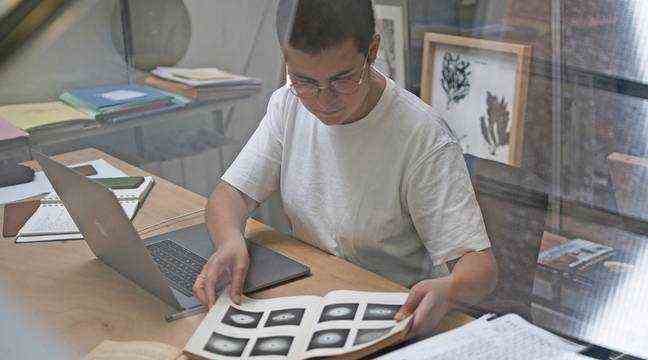She sees her profession as cooking, sharing with chefs a taste for the alchemy of products, local and seasonal of course. However, it was towards the design of objects that Lucile Viaud turned seven years ago. A graduate of the Boulle school in Paris, she has since been thinking about how to “do the best with as little as possible”. It is in Brittany that the young woman of 27 years put down her suitcases, finding there the inspiration but especially the raw materials for her creations. “I started by working on fish skin before discovering the richness and potential offered by marine resources,” she says.
Originally from Lorraine, Lucile Viaud first developed a “plaster of the sea” recipe from oyster, mussel or abalone shells. The work of this “artist-researcher”, who likes to create a dialogue between “art and science”, then led her to specialize in the formulation of glasses, always using natural resources. “I will meet the producers and I adapt according to the available stocks and the seasons”, specifies the young woman.
His creations on the tables of starred restaurants
Once her net was filled with shells, shells and algae, she took charge of the Rennes chemical science institute on the Rennes 1 campus, where she made her “glass recipes”. He then has to sort, clean, crush and sift all this sea waste before mixing them to make a kind of flour. The material obtained then goes to the Silicybine workshop in Arcueil. This is where the decorative objects and tableware will be produced by hand and in small series by a glassblower.
“We make around 300 kg of glass a year, or around 500 pieces,” says the designer. Sold under the Ostraco brand, its collection of sea glass Glaz (typical color of Brittany which mixes blue, green and gray) quickly won over many chefs in the region. They can be found on the tables of starred restaurants such as Le Coquillage by Hugo Roellinger in Cancale, Racines in Rennes or the Moulin de Rosmadec in Pont-Aven.
A glass of Occitanie and soon of Lorraine
His work also caught the eye of the jury of the Young Remarkable Initiative Prize which has just awarded him a scholarship of 4,000 euros. In search of new territories and new resources for her creations, Lucile Viaud set sail for Occitania last year with a Rouergue glass collection, produced from snail shells and sand from the banks of the Lot. and firewood ash.
Soon, her inspiration will take her to her native region with a project for a collection of glass objects designed from the steel and metallurgical resources of Lorraine.

